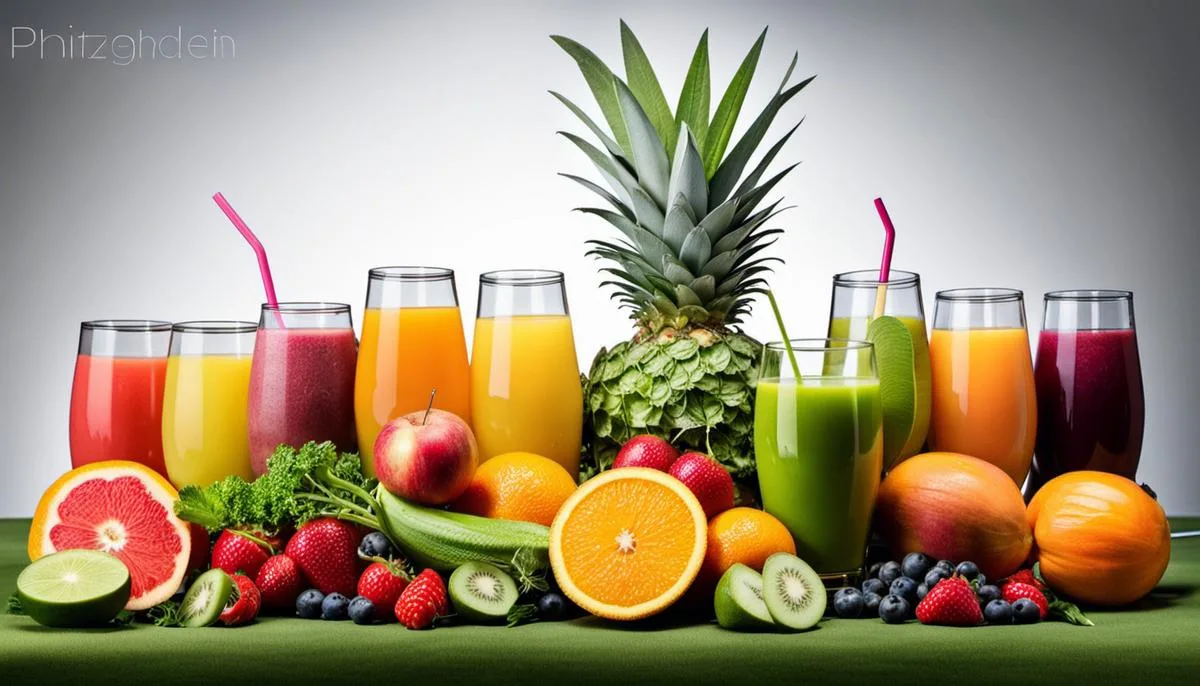In a society defined by an incessant quest for health and well-being, the concept of juicing has surged in popularity. Essentially a practice of extracting juices from fruits and vegetables, juicing promises to bolster nutrient intake, aid digestion, and to some degree, assist in weight loss. A firm understanding of juicing’s efficacy, however, necessitates a balanced perspective – acknowledging its potential health benefits alongside its inherent risks.
This provides a comprehensive platform for exploring juicing in the context of weight loss specifically, with a focus on appropriate fruits and vegetables and practical tips to avoid common mistakes. Moreover, by introducing empirical evidence and personal success stories, we can examine juicing’s sway on weight loss comfortably grounded in reality.
Understanding the Concept of Juicing
Understanding the Concept of Juicing
Juicing refers to the process of extracting liquid or juice from fruits and vegetables. This process allows you to consume a high amount of vitamins, minerals, and phytonutrients present in fruits and vegetables easily. Depending upon the type of juicer used, the juice produced can be a smooth blend or a liquid with most of the pulp removed.
Juicing has a long history that traces back to centuries when manually operated juice squeezers were used to extract juice from fruits. The modern era brought us motor-driven juicers, which made it easier to produce juice at home. Today, there are a diverse range of juicers from centrifugal models that rapidly spin the fruits and vegetables to break them down, to masticating or “cold press” styles that slowly crush produce for a higher yield of juice.
As people have become more health-conscious, juicing has grown in popularity. People have started including it in their regular diet as a source of nutrients and a way to increase overall fruit and vegetable intake. Some popular juicing trends include green juice, antioxidant-rich berry blends, and detox or “cleanse” juice fasts.
Juicing and a Balanced Diet
In the context of a balanced diet, juicing can play a significant role when done correctly. The juices are typically high in vitamins and can complement your daily dietary needs. However, it’s important to note that juices should not replace the consumption of whole fruits and vegetables entirely, as these provide necessary fibers and other nutrients that are often lost in the juicing process.
While juicing can be a great source of nutrients, moderation is the key. Consuming juice in excessive amounts can cause various issues like high sugar intake, particularly from fruit-heavy juices, and can potentially lead to nutritional imbalances if juice replaces too many whole foods in your diet.
Exploring Juicing for Weight Loss
When it comes to shedding those extra pounds, juicing can be considered as an efficient tool if incorporated sensibly into your dietary routine. Juices, particularly those made from veggies, are typically lower in calories. Hence, replacing a meal or snack with a glass of juice each day can potentially result in a caloric deficit, instigating weight loss. Moreover, juicing boasts the ability to detoxify your body by flushing out harmful toxins, thereby possibly speeding up your metabolism and promoting further weight loss.
However, it is critical to understand that long-term indulgence in juice diets or so-called juice ‘detoxes’— wherein one consumes exclusively juice for extended periods— is not an advisable or balanced way to accomplish weight loss. Extremes such as these can give rise to adverse health impacts, like nutrient deficiencies, muscle deterioration, and metabolic disturbances.
For a healthy and balanced weight loss approach involving juicing, try integrating it within a diet that encompasses lean protein, whole grains, and a sufficient amount of fruits and vegetables in their intact form. Also, make sure to predominantly go for juices made out of vegetables for the least sugar content. Complementing this approach with a regular exercise regimen and proper hydration can pave the way for a safe and sustainable weight loss journey.

Benefits and Risks of Juicing
Appreciating Juicing and its Growing Popularity
In recent years, juicing has garnered immense attention, mainly as a means to lose weight and detoxify the body. This technique involves the squeezing or blending of fruits and vegetables to extract their juice, which is a powerful source of nutrients. A substantial number of individuals find juicing to be a convenient method to augment their intake of fruits and vegetables, which are vital for a nutritionally balanced diet.
Health Benefits of Juicing
One of the main benefits of juicing is that it increases your intake of fruits and vegetables, which are rich in essential vitamins, minerals, and antioxidants that promote health. Regular consumption of fruits and vegetables has linked with numerous health benefits, such as improved heart health, reduced cancer risk, and enhanced gut health.
Juicing can help deliver these nutrients more easily as they are in a digestible form. This can be beneficial for individuals with digestive issues, as it allows them to consume these crucial nutrients without causing stomach upset.
Moreover, fruits and vegetables are low in calories and high in fiber, key components in weight loss. The fiber content can make you feel full, reducing your appetite and preventing overeating. Plus, replacing unhealthy, high-calorie snacks or meals with fruit and vegetable juice can help you cut back on total calorie consumption, promoting weight loss.
Potential Risks of Juicing
Despite its advantages, juicing also has its downsides. One noticeable drawback is the elevated sugar content found in juice. When you juice fruits, you remove the pulp, which contains fiber. This fiber helps slow down the absorption of sugar into your bloodstream, preventing a sugar spike. Drinking only the juice means you’re getting all that fruit sugar in a concentrated form, which can lead to increased blood sugar levels.
On top of that, even though vegetable and fruit juice can have an array of vitamins and minerals, it typically lacks protein and fat, both essential parts of a balanced diet. Long-term reliance on juice for nutritional needs can lead to nutrient deficiencies, specifically of those found in protein-rich and fat-rich foods.
Furthermore, juicing can become a problem when it is used as a crash diet or cleanse. This method of weight loss is generally not sustainable and can lead to a yo-yo dieting effect, where individuals lose weight quickly, but gain it back as soon as they return to their normal eating habits.
The Role of Juicing in a Balanced Diet
Juicing is often seen as an advantageous way to add to one’s diet, but it’s crucial to understand that it should play a role within a balanced dietary regimen rather than being the focal point. Consuming whole fruits and vegetables remains critical, given the beneficial fiber content present in them, which can be lost during juicing. Not to mention the potential risk of excessive sugar intake from juice alone. Thus, crafting your juice with a wide assortment of fruits and vegetables can help ensure that you take in a broad spectrum of nutrients.
When done properly and when integrated thoughtfully into your overall meal plan, juicing can be a bright spot of health, convenience, and flavor. It’s a delightful method to enhance your fruit and vegetable consumption, aiding you in striving towards your weight loss objectives. Remember, it’s always important to touch base with a healthcare professional or a registered dietitian before you initiate a juice-centric weight loss regimen to guarantee that it respects your specific health requirements.

Juicing for Weight Loss
Exploring the Benefits of Juicing for Weight Loss
Using juicing as a tool for weight loss can be effective, particularly in the realm of instigating a calorie deficit. You can create fulfilling and low-calorie juice concoctions from nutrient-dense fruits and vegetables, which can satiate your hunger and suppress excessive cravings. This strategy allows you to pack in a high quantity of fruits and vegetables, offering your body the vital vitamins and minerals it requires, whilst keeping the calorie intake in check.
Nevertheless, remember that juicing removes dietary fiber from the fruits and veggies. Consequently, juicing only represents a piece of the weight loss puzzle and should be used along with a nutritious, balanced diet and consistent exercise routine for optimal results.
Best Fruits and Vegetables for Juicing
When it comes to choosing the best foods for juicing, some low-calorie fruits and vegetables are more beneficial than others. Fresh vegetables such as leafy greens (spinach, kale), celery, cucumbers, and beetroots are popular choices. The low sugar content of vegetables makes them ideal for weight loss. Citrus fruits like grapefruit, lemon, and oranges are also good choices, as they are relatively low in calories and high in vitamin C. Additionally, apples and pineapples, while slightly higher in calories, can add sweetness to your juice without the need for added sugar.
Juicing Frequency and Calorie Management
The frequency of juicing varies based on individual goals and overall dietary intake. If you’re using juicing as a means to supplement your balanced diet, once a day may be sufficient. However, it’s important to keep track of the calories in your juice and ensure it fits within your daily calorie goals to maintain or lose weight. A common mistake is overconsuming juices under the guise of health, leading to inadvertent weight gain.
Juicing Recipes for Weight Loss
An example of a weight-loss juice recipe includes: a handful of kale, one apple, half cucumber, and a slice of lemon. This combination is rich in dietary fibers and promotes feelings of satiety. Another beneficial recipe is a combination of two stalks of celery, one small beet, and a slice of lemon. This juice is packed with nutrients and is low in sugar. Of course, these are suggestions and it’s encouraged to experiment with different kinds of fruits and veggies according to your preferences.
Incorporating Juices into a Balanced Diet
Juicing should be seen as an addition to a well-balanced, healthy diet, rather than a replacement. It’s important to remember that juice, while nutritious, doesn’t contain all the necessary macronutrients such as fat or protein. Hence, it’s crucial to incorporate a variety of food types into your diet to meet your nutritional needs. For instance, pair your juice with a source of lean protein for breakfast or have it as a refreshing snack between meals.
Understanding the Potential Risks of Juicing
As you consider juicing as a potential weight loss method, it’s crucial to recognize the possible dangers associated with it. The process of juicing eliminates the fiber from fruits and vegetables, which can potentially increase hunger and lead to overeating. Furthermore, a long-term juice diet can result in nutrient deficiencies due to the absence of certain food groups. Therefore, it is strongly recommended that you consult with a dietitian or healthcare professional before incorporating major dietary changes such as juicing.

Mistakes to Avoid When Juicing for Weight Loss
Comprehending the Role of Juicing in Weight Loss
In the quest for weight loss, more people are integrating juicing as a potential strategy, mainly owing to its ability to detoxify the body and kickstart weight reduction. Although juicing can indeed facilitate weight loss, it’s essential to realize that it’s not a panacea. Use of this strategy without proper understanding and execution could inadvertently lead to weight gain or nutrient deficiencies.
Common Mistake #1: Relying Solely on Juices for Nutrient Intake
One of the most common mistakes when juicing for weight loss is using juices as a complete meal substitute, rather than as part of a balanced, nutritious diet. While it’s true that juices can be densely packed with nutrients, they don’t provide all the necessary balance of fats, proteins, and carbohydrates that the body needs. Moreover, juices lack fiber, a crucial component that aids in digestion, provides satiety, and helps manage blood sugar levels—key elements in a successful weight loss strategy.
Common Mistake #2: Overindulging in Sweet Fruits
Fruits are a common go-to ingredient in juicing because of their sweet taste and high nutrient content. However, fruits are also packed with natural sugars. Consumed in excess, sugary fruits may lead to weight gain rather than loss, as the body converts surplus sugars into fats. It’s healthier to strive for a balance between fruits and vegetables in your juices, prioritizing low-sugar fruits like berries and tart apples, and nutrient-rich leafy greens.
Common Mistake #3: Neglecting Whole Foods
While incorporating fresh juices into your diet can provide a nutrition boost, neglecting whole foods is a major pitfall. Your body needs more than just what juices can provide. Whole foods have the necessary fiber content that juicing removes; they also provide a balanced meal, containing essential fats and proteins that juices lack. Incorporating whole grains, lean proteins, and healthy fats into your diet alongside the juices ensures you’re getting a well-rounded intake of nutrients.
Common Mistake #4: Straying from Portion Control
Just because it’s a glass of freshly squeezed juice doesn’t mean you can guzzle as much as you want. As with all foods, portion control is essential. Excess intake of anything, even nutritious juice, can lead to weight gain. Typically, a proper portion size is about 8 ounces of juice.
Common Mistake #5: Neglecting Exercise
Finally, juicing, like any weight loss method, should be combined with regular, balanced physical activity. Exercise not only burns calories but also builds muscle, which increases your metabolism and aids in burning more calories in a rest state. By focusing solely on diet without the addition of exercise, weight loss will be slower and harder to maintain in the long run.
In closure, it is critical to note that juicing can be an advantageous tool for weight loss when utilized correctly. However, one must consciously avoid prevalent mistakes to optimally navigate their journey towards attaining and maintaining a healthy weight.

Real-life Success Stories and Scientific Backup
Inspiring Real-Life Accounts of Weight Loss Achievements through Juicing
We find countless testimonies of individuals who have tasted the fruits of success in terms of weight loss through juicing. Notable amongst them is the journey of Joe Cross, an Australian businessman who shed an impressive 100 lbs in just two months employing a juice diet. The transformative account of Cross, captured and shared through the documentary “Fat, Sick, and Nearly Dead”, has motivated millions worldwide to adopt juicing engagedly.
A remarkable transformation story is that of Phil Staples, a truck driver who took the road to health after a chance encounter with Cross. Staples shed a whopping 200 lbs all thanks to juice fasting, and managed to keep the weight off by wisely incorporating healthy alternatives into his routine meals post the fast.
Another testimony hails from Tracy, a Texan, who lost an impressive 60 lbs in merely 4 months, backed by her juicer and resolve. Tracy’s weight management journey not only saw her lose pounds but also battle her fibromyalgia and chronic fatigue syndrome symptoms effectively, feeling much healthier and lively thereafter.
Scientific Studies on Juicing for Weight Loss
While the benefits of juicing are clearly demonstrated through such stories, science offers a more nuanced perspective. A study published in the Journal of the Academy of Nutrition and Dietetics suggested that consuming fresh juice could promote better nutrient intake. However, the same study cited concerns about juicing potentially leading to a lack of protein and dietary fiber, which are key to maintaining a healthy body.
A research review published in Current Obesity Reports highlighted that while juice fasting may help individuals lose weight initially, maintaining that weight loss can be challenging. As per researchers, the practice may also lead to nutritional deficiencies if followed for an extended period.
Another comprehensive review was done by Mayo Clinic staff which concluded that while there’s no scientific evidence specifically that juicing helps with weight loss, eating more fruits and vegetables, in general, is a good thing. However, they highlighted that juice is not a replacement for whole foods.
A study conducted by Penn State University indicated that consuming low-calorie vegetable juice can help overweight individuals lose weight. Moreover, individuals who consumed vegetable juice were more likely to get the recommended 3 to 5 servings of vegetables daily.
Thus, while there are clear success stories about the effectiveness of juicing in weight loss, science indicates that one should approach juicing wisely, consider the quality of the juices they consume, and most importantly, aim to balance their juice intake with other nutritious foods.
Expert Opinions On Juicing For Weight Loss
Experienced dietitians and nutritionists have also shared their thoughts on juicing. As per them, while juicing can contribute to weight loss by drastically reducing calorie intake, its long-term impact on fat loss is not significant. They frequently suggest individuals to utilize juicing as a jump-start for adopting healthier eating habits, rather than a fix-all solution.
Moreover, some experts recommend consuming the juice alongside other foods, preferably proteins, to avoid blood sugar spikes. They also recommend including pulpy, fibrous material leftover from the juice extraction, as they are rich in dietary fibers.
While real-life success stories may make juicing appear as a magic bullet for weight loss, the scientific evidence suggests otherwise. Juicing can certainly be a part of an overall healthy diet, but it is not a one-step solution to weight loss. Rather, a balanced dietary approach, incorporating a variety of nutritious foods along with consistent exercise, stands as the most sustainable path to weight management.

Acknowledging the rich tapestry of information presented, it’s clear that juicing represents a potential tool in the toolbox of weight loss. The key, though, is moderation and balance, treating it as a supplement, not a solution, to a healthy, balanced diet. It is hereby encouraged to consider the varieties of fruits and vegetables that harbor weight-loss supporting nutrients, whilst negotiating the widespread misstep of over-reliance on juicing.
Finally, let the real-life success stories featured herein serve as inspiration, yet take them in stride with the context of scientific findings. As such, the journey of weight loss, with juicing as a supportive, not solitary companion, becomes a journey of informed, healthier choices, echoing the principle that true health is a long-term commitment and not a fleeting trend.
Thank you for reading this post, don't forget to subscribe to our free newsletter
!
